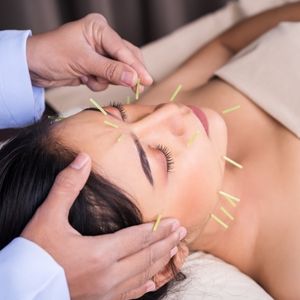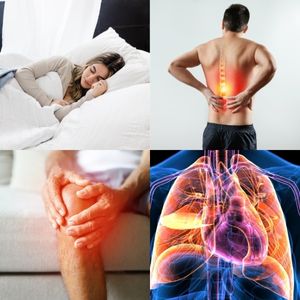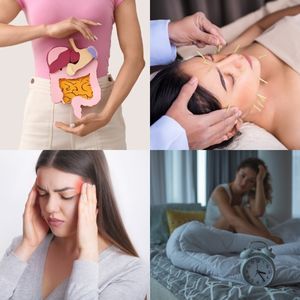
From PCOS to Chronic Pain: The Holistic Treatment Spectrum of Acupuncture
Acupuncture is an ancient therapeutic practice rooted in Traditional Chinese Medicine (TCM). It involves the insertion of fine, sterile needles into specific points on the body, known as acupoints. These points correspond to the body’s meridians, which are believed to regulate energy flow or “Qi” (pronounced as “Chi”). The goal is to restore balance, improve circulation, and stimulate the body’s natural healing mechanisms.
How does Acupuncture help?

Acupuncture works on multiple levels:
Physical: It alleviates pain, reduces inflammation, and enhances mobility.
Neurological: Stimulates the nervous system, aiding in conditions like migraines and neuropathy.
Hormonal: Balances hormones, helping manage PCOS, thyroid disorders, and infertility.
Emotional: Reduces stress and anxiety, promoting mental clarity and emotional well-being.
Acupuncture as a Treatment
Acupuncture is increasingly recognized as a complementary therapy that enhances the effectiveness of primary treatments. For example, it is often used alongside physiotherapy for pain management, counseling for stress relief, or conventional treatments for chronic conditions such as arthritis. Acupuncture also helps reduce side effects of treatments like chemotherapy, making it an excellent adjunct therapy.
Ailments and Wellness Goals Addressed by Acupuncture

Knee Pain management
Improved Sleep
Support Weight Management
Enhances Digestive System
Respiratory Health
Eye Health
Lower Back Pain
Dental Pain
Boost Immune Functions
Improves the Skin health
Rehabilitation
Conditions and Wellness Goals Addressed by Acupuncture

Acupuncture is versatile, with applications ranging from chronic illnesses to aesthetic improvements:
Neurological Disorders:
Migraines
Parkinson’s Disease
Stroke Rehabilitation
Pain Management:
Back and neck pain
Joint issues, including arthritis
Sports injuries
Hormonal Disorders:
PCOD/PCOS
Thyroid disorders
Infertility
Digestive Health:
Irritable Bowel Syndrome (IBS)
Acid reflux
Constipation
Cosmetic Acupuncture:
Anti-aging benefits, including wrinkle reduction and skin rejuvenation.
Emotional and Mental Well-being:
Insomnia
Stress and anxiety relief
Wellness Goals:
Boosting immunity
Detoxification
Weight management
Legal and Regulatory Framework for Acupuncture
Acupuncture in India
In India, acupuncture is increasingly recognized as a legitimate therapy. Some key highlights of the regulatory environment include:
Recognition as a Practice:
In 2003, the Ministry of Health and Family Welfare acknowledged acupuncture as an “allied health therapy.”
Several states, including Delhi and Maharashtra, have specific frameworks allowing licensed practitioners to practice acupuncture.
Education and Certification:
A formal qualification such as a BNYS (Bachelor of Naturopathy and Yogic Sciences) or a Master’s degree in acupuncture is required.
Short-term certifications are insufficient for independent practice.
Regulation by AYUSH (Ayurveda, Naturopathy, Yoga, Unani, Siddha and Homeopathy) System:
Acupuncture often falls under the Ministry of AYUSH’s purview when integrated with naturopathy or ayurveda. It is recognized under the Ministry of AYUSH when combined with naturopathy or Ayurveda, aligning with holistic healing principles.
Complementary to Naturopathy: Enhances detoxification, pain relief, and stress management.
Synergy with Ayurveda: Balances doshas and supports treatment of chronic conditions like pain and insomnia.
Support for Yoga Practices: Improves flexibility, reduces tension, and enhances mental clarity.
Regulation and Education: Requires accredited degrees (e.g., BNYS) or specialized training, focusing on ethical, sterile, and evidence-based practices.
Expanding Legitimacy: Acupuncture’s inclusion in AYUSH combines traditional Chinese and Indian systems for comprehensive healthcare.
Global Laws and Standards
United States:
Acupuncture is regulated on a state-by-state basis.
Practitioners must hold a license from the National Certification Commission for Acupuncture and Oriental Medicine (NCCAOM).
United Kingdom:
Acupuncture is not regulated by law but is widely practiced under voluntary professional bodies like the British Acupuncture Council (BAcC).
Maldives:
Acupuncture is primarily offered in wellness resorts or under licensed medical practitioners.
World Health Organization (WHO):
WHO recognizes acupuncture as a valid treatment for over 100 conditions and offers guidelines for safe practice.
Pain Management:
Chronic Pain: Reduces pain from conditions like back pain, osteoarthritis, and neck pain.
Headaches/Migraines: Reduces frequency and intensity of migraines and tension headaches.
Musculoskeletal Pain: Alleviates conditions like tennis elbow, shoulder pain, and knee pain.
Neurological Disorders:
Stroke Rehabilitation: Improves motor function and reduces spasticity.
Parkinson’s Disease: Enhances motor function and reduces tremors.
Neuropathy: Alleviates nerve pain, including diabetic neuropathy.
Respiratory Disorders:
Asthma: Reduces attack frequency and improves lung function.
Allergies: Modulates immune system and reduces symptoms like nasal congestion.
Digestive Disorders:
IBS: Alleviates bloating, abdominal pain, and irregular bowel movements.
Acid Reflux/Heartburn: Regulates digestive juices and reduces inflammation.
Hormonal Imbalances/Fertility:
PCOS: Regulates menstrual cycles, balances hormones, and improves fertility.
Infertility: Enhances blood flow and balances hormone levels.
Mental Health:
Anxiety/Depression: Regulates neurotransmitter levels, promotes relaxation.
Insomnia: Improves sleep patterns by calming the nervous system.
Addiction/Substance Abuse:
Smoking Cessation: Reduces cravings and withdrawal symptoms.
Alcohol Addiction: Stabilizes mood and reduces cravings.
Skin Conditions:
Acne/Eczema: Improves skin health by reducing inflammation.
Anti-Aging: Enhances skin elasticity and reduces wrinkles.
WHO Guidelines for Safe Practice:
Training and Certification: Practitioners must be formally trained and certified.
Sterility and Hygiene: Use sterile needles and maintain hygiene.
Individualized Treatment: Tailored plans based on each patient’s needs.
Monitoring: Regular evaluation and adjustments to treatment.
Case Studies: Real-Life Success Stories
Case Study 1: PCOS Management
A 28-year-old woman presented with irregular periods, acne, and difficulty conceiving. After 12 sessions of acupuncture targeting hormonal regulation and stress reduction, she experienced regular menstrual cycles and improved fertility markers. Six months later, she reported a successful pregnancy.
Case Study 2: Chronic Lower Back Pain
A 45-year-old man suffering from chronic lower back pain due to a herniated disc sought acupuncture treatment after limited relief from conventional treatments. Over eight weeks, acupuncture sessions focused on pain reduction and improved mobility. By the end of the program, he reported significant pain relief and resumed daily activities without discomfort.
Case Study 3: Post-Stroke Rehabilitation
A 62-year-old stroke survivor struggled with weakness and limited mobility on her left side. A combination of acupuncture and physiotherapy helped restore motor function, reduce muscle stiffness, and improve her quality of life over three months.
Acupuncture for Severe and Mild Symptoms
Acupuncture is effective across a spectrum of conditions, from severe to mild:
Severe Symptoms
Chronic Pain: Offers long-term relief for debilitating conditions.
Stroke Aftermath: Enhances motor and cognitive recovery.
PCOS-Related Infertility: Promotes ovarian health and balances hormones.
Mild Symptoms
Stress and Fatigue: Provides immediate relaxation and energy restoration.
Digestive Issues: Quickly addresses bloating and mild discomfort.
Seasonal Allergies: Alleviates symptoms like nasal congestion and watery eyes.
Acupuncture as a Secondary Treatment
Acupuncture excels as a complementary therapy, enhancing the efficacy of primary treatments. Physiotherapy is an essential tool in recovering from injuries and surgeries, as it helps reduce pain, decrease inflammation, and improve mobility, ensuring a smoother rehabilitation process.
When combined with counseling, it addresses the physical symptoms of stress and anxiety, fostering holistic mental and physical wellness.
In conjunction with conventional medicine, physiotherapy alleviates side effects of treatments like chemotherapy or medications for chronic illnesses, providing comprehensive support for patients.
The Future of Acupuncture
With growing acceptance in integrative medicine, acupuncture bridges the gap between traditional healing and modern science. Its ability to treat the whole person body, mind, and spirit makes it an invaluable tool in achieving optimal health and well-being. Whether you are seeking relief from chronic conditions or aiming to enhance your overall wellness, acupuncture offers a safe, effective, and holistic approach to healing.



Leave A Comment